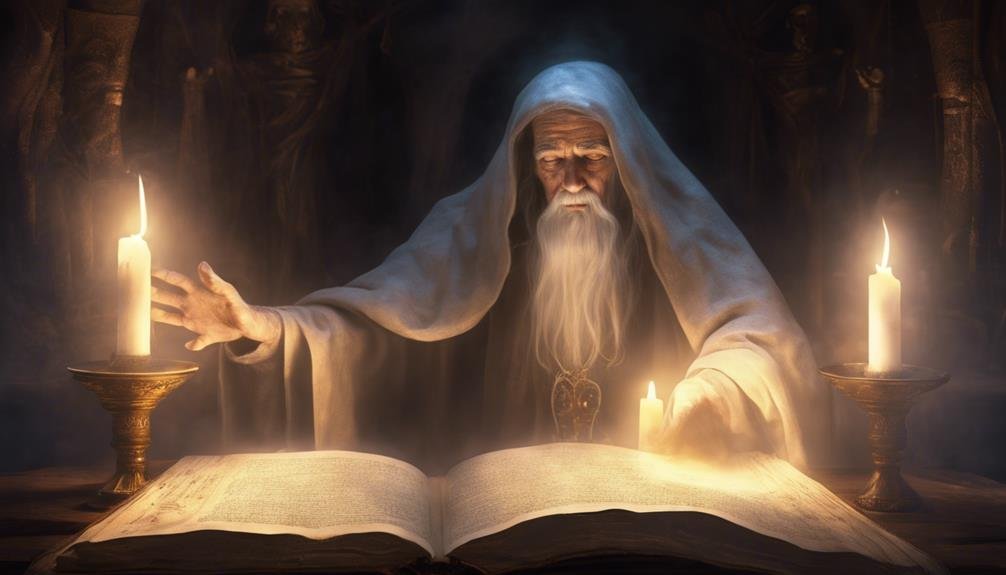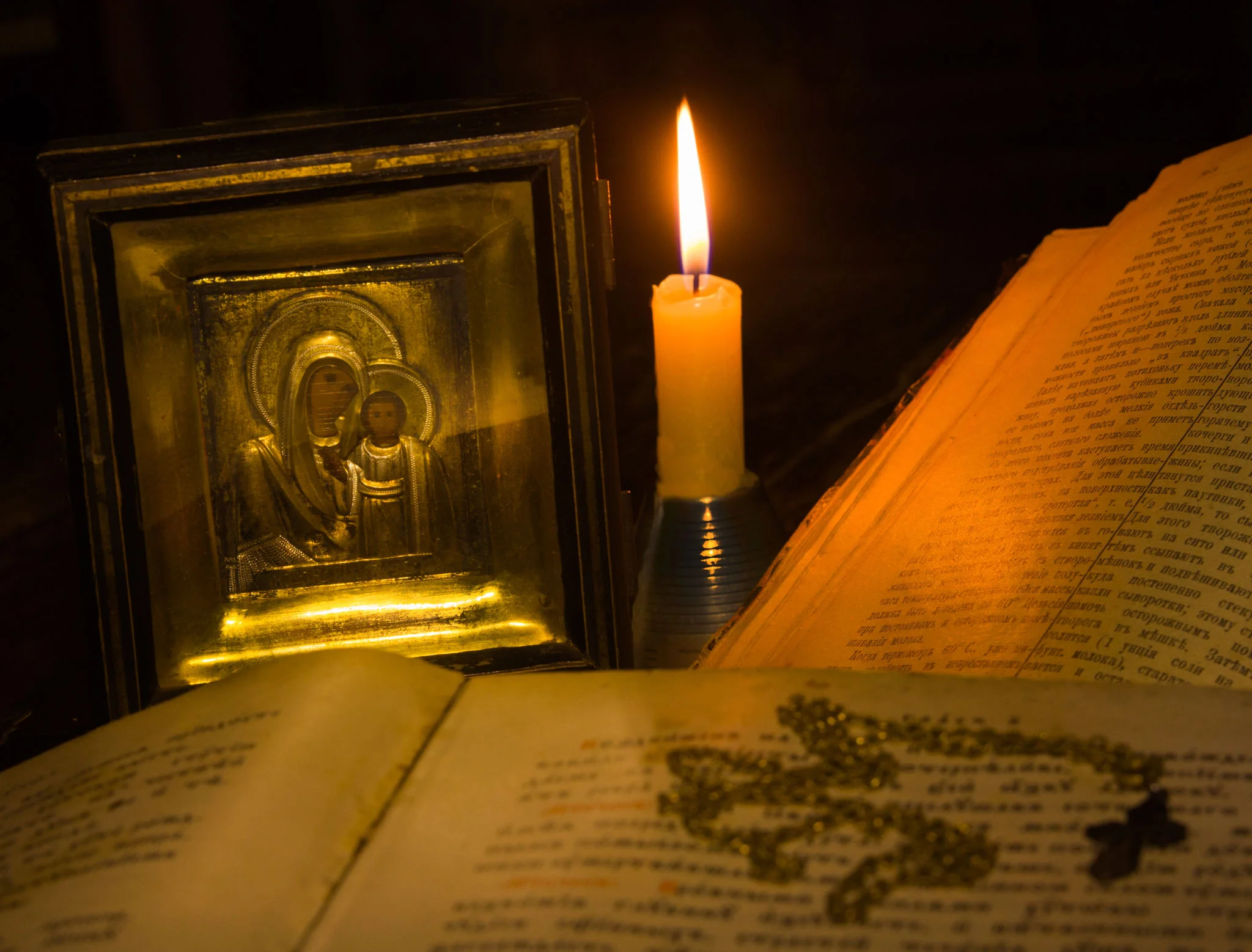When you think about delving into the Book of Enoch, you might ask yourself why it’s not included in the Bible. This text is non-canonical and hasn’t been endorsed in the New Testament, suggesting significant theological divergences from the accepted Christian doctrine. Could engaging with this book lead to doctrinal confusion? It’s important to understand the potential challenges and implications before you proceed. You might wonder what historical, cultural, and spiritual considerations are at play here. Let’s explore why focusing on canonical Scripture might be a more secure path for your faith journey.
Key Takeaways
- The Book of Enoch is excluded from the biblical canon and lacks New Testament endorsement, questioning its authority.
- It presents teachings that diverge from orthodox Christian doctrine, leading to potential doctrinal confusion.
- Historical accuracy is contentious due to uncertainties about its authorship and deviations from accepted biblical narratives.
- It contains mystical and occult content, which may contradict mainstream Christian beliefs.
- Canonical Scripture provides a consistent message, and focusing on these texts enriches faith and spiritual guidance.
Non-Canonical Status
The Book of Enoch‘s exclusion from the biblical canon is significant, highlighting its non-canonical status. When exploring the reasons behind this, it’s important to understand that early church fathers didn’t view the Book of Enoch as possessing divine inspiration. Its teachings diverged from mainstream Jewish and early Christian beliefs, which contributed to its exclusion. This decision underscores the significance placed on theological consistency within the canonical texts.
You might wonder why the Book of Enoch, despite its intriguing content, wasn’t included as inspired Scripture. Its absence from the Bible essentially raises questions about its authenticity and authority. Without the church’s endorsement, doubts about the Book’s divine inspiration persist, leaving it outside the boundaries of what’s considered.
Most Christian traditions today align with this perspective, not recognizing the Book of Enoch as part of the authoritative Scriptures. Its non-canonical status suggests caution when approaching its contents. While it offers fascinating narratives, its teachings aren’t considered doctrinally sound within mainstream Christianity. Understanding its place outside the canon can help you navigate the complexities of ancient texts and their religious significance.
Lack of New Testament Endorsement
New Scripture writings don’t directly endorse or cite the Book of Enoch, which casts doubt on its divine inspiration. The New Testament writers responsible for the scriptures never referred to the Book of Enoch as an inspired or authoritative source. This absence of recognition is significant because it suggests that early Christian figures didn’t view it as divinely inspired. If the authors of the New Testament, whose works are central to the canon of Scripture, Scriptureegard the Book of Enoch as worthy of mention, that alone should cause you.
Staying away from the Book of Enoch becomes even more convincing when considering how religious leaders approached its inclusion in the biblical canon. They deliberately excluded it, likely due to its lack of endorsement by New Testament writings. This decision wasn’t made lightly, and their discernment played an essential role in shaping what we now recognize as canonical scriScripturethoScripturew Testament’s validation, the Book of Enoch’s authority remains doubtful.
Theological Divergences
Many of the theological teachings in the Book of Enoch differ significantly from mainstream Jewish and early Christian beliefs. This Book introduces concepts and interpretations that might contradict orthodox Christian doctrine. When you explore the Book of Enoch, you’ll encounter ideas that the early Christian communities didn’t accept. The biblical figure Enoch, known for his righteousness, takes a prominent role in this extra-Biblical writing, presenting perspectives on angels and ungodly acts that aren’t aligned with canonical scriptures.
| Doctrine | Book of Enoch | Orthodox Belief |
|---|---|---|
| Nature of Angels | Fallen angels uniting with humans | Angels as spiritual beings, no union |
| Judgment and Salvation | Enoch, as an intern, diary | Christ as the exclusive intermediary |
| Origin of Sin | Associated with angels’ ungodly acts | Sin originating from Adam and Eve |
| Cosmic Order | Complex celestial hierarchies | Simplified in canonical texts |
| Role of Enoch | Elevated to a quasi-divine status | Acknowledged as a biblical figure only |
These theological differences may lead you away from the main message of salvation through Christ found in the Cal Scriptures. Scholars often caution against relying on the Book of Enoch for doctrinal truths. It’s essential to approach its teachings with discernment, examining them in light of established biblical truths.
Cultural Context Challenges
While theological divergences in the Book of Enoch are important, understanding its cultural context presents its own challenging texts that reflect ancient Jewish beliefs and practices, demanding a solid grasp of cult standing to interpret its content accurately. Many modern readers, unfamiliar with ancient Jewish thought, may find it difficult to comprehend the cultural nuances embedded in the Enoch. This lack of familiarity can lead to misunderstandings of its unique theological perspectives.
The early church fathers debated its inclusion among canonical texts, partly due to these cultural complexities. They recognized that withoutther interpretation,s could be skewed or incomplete ough knowledge of the historical contexts and traditions from which the Book of Enoch emerged; Interprets the importance of understanding the cultural backdrop to fully appreciate its to appreciate its themes and teachingsinfluences how the Book of Enoch’s messages are interpreted and applied. Without this understanding, there’s a risk of misapplying its teachings or misinterpreting its significance within the broader religious landscape. Hence, the cultural context challenges are an essential reason for some advice staying cautious with the Book of Enoch.
Historical Accuracy Concerns

The Book of Enoch‘s historical accuracy remains contentious, primarily because of uncertainties about its authorship and composition. When you look at what’s inside, the Book of Enoch offers a narrative that diverges markedly from mainstream Jewish and Christian beliefs. This divergence raises historical accuracy concerns, making it tricky to determine how much of its content reflects actual historical events or theological innovations of its time.
The Book of Enoch contains early writings that weren’t widely accepted among Jewish and Christian communities. This lack of acceptance hints at potential inaccuracies or theological deviations that early religious leaders found problematic. Because it didn’t align with established doctrines, the Book of Enoch wasn’t included in the canon. Its exclusion by early church leaders and councils suggests they didn’t see it as divinely inspired, further casting doubt on its historical reliability.
You might wonder why such early writings weren’t embraced more fully. One reason is that its theological teachings often clash with established biblical doctrines. These discrepancies contribute significantly to historical accuracy concerns. So, while the Book of Enoch offers intriguing insights, its historical grounding remains questionable.
Scholarly Debates
Scholars actively debate the origins and authorship of the Book of Enoch, fueling questions about its place in religious history. This ancient text, with its writings attributed to Enoch, who “walked with God,” sparks intrigue due to its absence from the Old extbf{Covenant}.
The debate intensifies, considering its mention in the Book of Jude, which adds a layer of complexity to its historical significance. Despite its early origins, the Book of Enoch isn’t part of mainstream Jewish or Christian canons, leading scholars to question its theological validity.
Theological differences between the Book of Enoch and established beliefs deepen scholarly discussions. Early church leaders and councils didn’t affirm the divine inspiration of this text, which further complicates its acceptance.
The fact that major religious communities do not widely embrace it highlights scholarly skepticism regarding its significance—the exclusion of the Book of Enoch from most scholars and its theological implications.
While some find value in its narratives and are intrigued by the Book of Enoch’s exclusion from most Christian canisters, others caution against its potential conflict with accepted doctrines and urge careful consideration of its role in religious thought.
Potential Doctrinal Confusion

As you explore the complex scholarly debates surrounding the Book of Enoch, consider the potential doctrinal confusion it can introduce. Enoch remains a controversial text due to its teachings that because of its teachings Christian beliefs, especially concerning angels and celestial hierarchies. These contradictions can mislead readers who expect to align with biblical teachings.
Additionally, the Book contains some prophecies that lead to doctrinal confusion. You might find yourself questioning the authWhenising doubts about its reliability.
You might also question the authenticity of Enoch. The Book of Enoch contains mystical and occult content that doesn’t align with biblical doctrine. Such material could involve you in things that ungodly sinners have spoken, potentially tearing you away from orthodox teachings. This deviation can create theological misunderstandings, as the text doesn’t always support the foundational beliefs found in the Bible.
Embracing Enoch as inspired Scripture might lead you into spiritual pitfalls, as its content can provide a clear message of the scriptures. Remember that the Bible calls believers to execute judgment wisely and avoid being swayed by teachings that don’t align with core Christian tenets.
Focus on Canonical Scripture
Turning your attention to canonical Scripture offers a solid foundation for understanding the core tenets of Scriptureianity. The Bible, as recognized by the biblical canon, has been firmly established through the teachings of Jesus and the apostles. They didn’t reference the Book of Enoch as an inspiration, reinforcing its exclusion from the canon. By focusing on the principles they uphold, you can better appreciate the consistent message of salvation centered on Christ.
Walking with God means embracing the Scriptures that guide you in truth and spiritual growth. The canonical texts have been preserved and revered throughout history, providing a reliable path for your faith journey. It’s essential to approach any non-canonical text with discernment, especially when it diverges from orthodox Christian doctrine.
While the Book of Enoch may hold some historical interest, its theological concepts don’t align with the core Christian beliefs found in the Bible. Instead, immerse yourself in the canonical texts, where the holy ones’ teachings can enrich your faith. You’ll stand and come to God’s truth by centering your spirit.
Importance of Spiritual by centering your spiritual walk on these trusted writingsGuidance

Embracing the Scriptures that form the foundation of Christian beliefs naturally leads you to seek spiritual direction. It’s imperative to rely on texts acknowledged for their divine inspiration and adherence to orthodox doctrine. The Book of Enoch, however, isn’t part of the Bible canon and lacks the endorsement of New Testament writers. This exclusion signifies the need to question its role in providing spiritual direction. The theological concepts found in Enoch diverge from established Christian teachings, making it a challenging source for spiritual ofdance.
| Aspect | Enoch |
|---|---|
| Canon Status | Not part of the Bible canon |
| Theological Alignment | Diverges from orthodox doctrine |
| Divine Inspiration | Not affOrthodox early church leaders and councils |
| Christian Traditions | Generally excluded from recognized Scriptures |
When seeking spiritual direction, turning to texts with uncertain authorship and composition dates, like Enoch, can lead to confusion rather than clarity. Early church leaders did not affirm its divine inspiration; most Christian traditions exclude it from their recognized Scriptures. For robust spiritual direction, engaging with canonical texts consistent with their spiritual authority and alignment with core Christian teachings is wise. Focusing on these establishes a solid foundation for your spiritual journey.
Strengthening Christian Faith
Strengthening your ChristiPrioritizingible is crucial, and it has been affirmed to strengthen your Christian faith. Generations on a Christ-centered approach have affirmed this. You align your beliefs with the core teachings that guide and support a cohesive spiritual journey.
This focus is vital for maintaining that your faith remains grounded in the religion recognized by most Christian traditions.
Biblical Truths First
The Christian faith is frequently built upon the unchanging found in the Bible. The Sces are a reliable guide for those who walked with God, serving as a solid base for your spiritual journey. When you approach biblical texts with discernment, you guarantee that your beliefs remain aligned with the core message of salvation through Christ.
The Book of Enoch, however, doesn’t share the same level of reliability due to its uncertain authorship and exclusion from the biblical canon.
It’s essential to recognize that the Book of Enoch isn’t part of the canon because it lacks endorsement from New Testament writers, and its theological concepts may diverge from orthodox Christian doctrine. As you seek to strengthen your faith, focus onnyoon only and,dunde undemanding this plat is plantal
Christ-Cenplantedocus
In the pursuit of strength, keeping is essential. The New Testament offers clear guidance for strengthening your Christian faith by centering on Jesus and His teachings. This focus underscores the core message of salvation and is pivotal for a solid Christian foundation.
It’s necessary to tread carefully when exploring texts like the Book of Enoch, which lacks endorsement from New Testament writers. The absence of such confirmation raises doubts about its relevance and reliability within a Christian context.
The Book of Enoch presents theological concepts that diverge from orthodox Christian doctrine. These variances can potentially lead believers astray, diverting attention away from the teachings of Jesus and the Holy Spirit.
Concentrating on Christ-centered scripturConcentrating your understanding of the un reinforces God’s WEmphasizeasize then changing truthnchored in the key tenets of your faith, ensuring a stronger and more steadfast Christian journey.
Approaching the Book of EnGiven its non-canonical status and debated historical context, approaching it is prudent. It is on-canonical, with the teachings of Jesus and the Holy Spirit, and it guarantees your spiritual growth remains rooted in the truth.
Conclusion
In [REPLACING: journeying] your spiritual path, it’s wise to focus on the Bible’s authoritative teBy. BBy dByng sprespresentslexitiesities and potential confusion in non-canonical works like the Book of Enoch. These texts might lead to doctrinal misunderstandings might lead to doctrinal misunderstandings, lacking New [REPLACING: testament] approval and diverging theologically. Instead, prioritize the unchanging truths of recognized divine inspiration, seek spiritual guidance, and strengthen your Christian faith through the solid foundation of Scripture Scripture.
FAQs
Why do some people suggest staying away from the Book of Enoch?
The Book of Enoch is considered controversial in religious trScripturebecause it is not included in the canonical Bible for most Christian denominations. Here are a few reasons some people suggest avoiding it:
- Non-Canonical Status: Most Christian traditions, including the Catholic and Protestant churches, do not accept the Book of Enoch as part of the Bible, meaning it is not regarded as divinelyScripture Scripture. Only the Ethiopian Orthodox Church includes it in its canon.
- Theological Confusion: Some argue that the Book of Enoch introduces a script that confuses readers, such as extensive details about angels and the Nephilim, which are not emphasized in the canonical Bible. This could lead to theological misunderstandings.
- SpeculatiBookontent: The Book contains fallen angels and otherworldly events that some believe go beyond what is revealed in the Scriptures. Critics argue that it promotes speculative and mystical ideas that are difficult to verify through other biblical texts.
Key Reasons for Avoidance:
- It is not part of the official Bible canon for most traditions.
- Potential for theological confusion.
- Speculative content about angels and the Nephilim.
Why is the Book of Enoch not included in the Bible?
The Book of Enoch is excluded from the Bible for several reasons:
- Authorship and AuthentiBook: While the Book is attributed to Enocattributedat, the grandfather of Noah, scholars believe it was written much later, around 300-2BookCE. The late date of its authorship has led many to question its authenticity and authority.
- Content anBookctrine: The Book contains unique narratives, such as detailed descriptions of fallen angels and the Nephilim, which are inconsistent with the central teachings of the canonical Bible. Many church leaders in the early centuries of Christianity found its content too speculative or inconsistent with Christian doctrine.
- Lack of Apostolic Endorsement: Books included in the Christian Bible often needed endorsement from apostles or early church leaders. Since the Book of Enoch was not early, church authorities did not widely accept it as canon.
Reasons for Exclusion:
- Questions about authorship and authenticity.
- Content inconsistent with mainstream biblical teachings.
- Lack of endorsement from early church leaders.
What does the Book of Enoch say about angels and the Nephilim?
The Book of Enoch gives extensive details about fallen angels and the Nephilim, beings mentioned briefly in the canonical Bible:
- Fallen Angels Bookchers): The Book Genexpansion describes angels called the Watchers who descended to Earth and sinned by matingBookh human women, resulting in the birth of the Nephilim, a race of giants.
- Nephilim: These giants, described as wicked and destructive, are said to have caused chaos on Earth, leading to God’s judgment through the Great Flood.
- JudgmentBookAngels: The bookBooko Bookks of the punitalks of the fallen angels, condemned by God and bound in darkness until the Day of JuBooknt.
While the canonical Bible briefly mentions the Nephilim, the Book of Enoch elaborates extensively on these themes, which some consider speculative or mythological.
Key Themes:
- Fallen angels (Watchers) mating with humans.
- Creation of the Nephilim (giants).
- God’s judgment on the angels and Nephilim.
Is the Book of Enoch used in any Christian traditions?
The Ethiopian Orthodox Church is the only major Christian denomination that accepts the Book of Enoch as part of its canon. They include it in their Bible, believing it to be divinely inspired and historically significant. However, other Christian denominations, including Roman Catholicism, Eastern Orthodoxy, and most Protestant groups, do not include it in their canon.
Traditions Using the Book of Enoch:
- Ethiopian Orthodox Church includes it in their canon.
- Not accepted by Roman Catholic, Eastern Orthodox, or Protestant traditions.
Can reading the Book of Enoch benefit biblical understanding?
Opinions vary on whether reading the Book of Enoch can benefit biblical understanding:
- Historical and Cultural Insight: Some people find value in reading the Book of Enoch to gain a deeper understanding of Jewish thought and early religious beliefs around the time of its writing. It can provide cultural and historical context for the Bible.
- Potential for Misinterpretation: Others caution that the bookBookld be confused if taken out of context as Scripture, especially for those not well-versed in theology. Its speculative content about angels and supernatural events could overshadow biblical teachings.
- Supplementary, Not Scripture: Many theologians recommend reading the Book of Enoch as supplementary material, similar to the Apocrypha, rather than as part of the Bible itself.
Benefits and Risks:
- Provides historical and cultural insight.
- Potential for confusion or misinterpretation.
- It is best read as supplementary maScriptureot Scripture.

